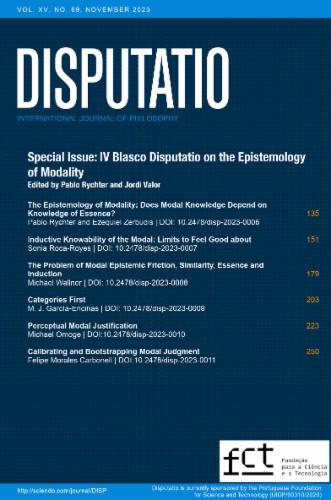[
Chalmers, David [2002]. “Does conceivability entail possibility?”. In Conceivability and Possibility, edited by T. S. Gender & J. Hawthorne. Oxford: Clarendon Press: 145–200.
]Search in Google Scholar
[
Fine, Kit [2022]. “Some Remarks on the Role of Essence in Kripke’s ‘Naming and Necessity’”. Theoria 88: 403–5.
]Search in Google Scholar
[
Hale, Bob [2013]. Necessary Beings: An Essay on Ontology, Modality, and the Relations Between Them. Oxford: Oxford University Press.
]Search in Google Scholar
[
Husserl, Edmund [1973]. Experience and Judgment. Investigations in a Genealogy of Logic. Revised and edited by Ludwig Landgrebe. Translated by James S. Churchill & Karl Ameriks. London: Routledge & Kegan Paul.
]Search in Google Scholar
[
Kripke, Saul [1971]. “Identity and necessity”. In Identity and Individuation, edited by M. K. Minitz. New York: New York University Press: 135–64.
]Search in Google Scholar
[
Kripke, Saul [1980]. Naming and Necessity. Oxford: Basil Blackwell.
]Search in Google Scholar
[
Mallozzi, Antonella [2021a]. “Putting modal metaphysics first”. Synthese 198: 1937–56.
]Search in Google Scholar
[
Mallozzi, Antonella [2021b]. “New directions in the epistemology of modality: Introduction”. in: Synthese 198: S1841–59.
]Search in Google Scholar
[
Mallozzi, Antonella [2021c]. “Superexplanations for counterfactual knowledge”. Philosophical Studies 178: 1315–37.
]Search in Google Scholar
[
Putnam, Hilary [1975]. “The meaning of ‘meaning’”. Minnesota Studies in the Philosophy of Science 7: 215–71.
]Search in Google Scholar
[
Roca-Royes, Sonia [2017]. “Similarity and possibility: an epistemology of de re possibility for concrete entities”. In Modal Epistemology After Rationalism, edited by R. Fischer and F. Leon. Dordrecht: Synthese Library Series: 221–45.
]Search in Google Scholar
[
Roca-Royes, Sonia [2018]. “Rethinking the epistemology of modality for abstracta”. In Being Necessary: Themes of Ontology and Modality from the Work of Bob Hale, edited by I. Fred-Rivera & J. Leech. Oxford: Oxford University Press: 245–66.
]Search in Google Scholar
[
Roca-Royes, Sonia [2023]: “Knowability of the modal and the limits of a posteriori induction”. Disputatio 69: 151–78.
]Search in Google Scholar
[
Sjölin Wirling, Ylwa [2020]. “Non-uniformism about the epistemology of modality: Strong and weak”. Analytic Philosophy 61: 152–73.
]Search in Google Scholar
[
Vaidya, Anand and Wallner, Michael [2021]. “The epistemology of modality and the problem of modal epistemic friction”. Synthese 198: S1909–35.
]Search in Google Scholar
[
Wallner, Michael [2023]. “In search of a structurally complete epistemology of essence”. In Epistemology of Modality and Philosophhical Methodology, edited by A. J. Vaidya & D. Prelevic. London, New York: Routledge: 150–75.
]Search in Google Scholar
[
Wallner, Michael and Vaidya, J. Anand [2020]. “Essence, explanation, and modality”. Philosophy 95: 419–45.
]Search in Google Scholar
[
Williamson, Timothy [2007a]. “Philosophical knowledge and knowledge of counterfactuals”. Grazer Philosophische Studien 74: 89–123.
]Search in Google Scholar
[
Williamson, Timothy [2007b]. The Philosophy of Philosophy. Oxford: Oxford University Press.
]Search in Google Scholar
[
Wittgenstein, Ludwig [1969]. On Certainty. Edited by G.E.M. Anscombe & G.H. von
]Search in Google Scholar
[
Wright. Translated by G.E.M. Anscombe & D. Paul. Oxford: Blackwell.
]Search in Google Scholar
[
Wright, Crispin [2004]. “Warrant for nothing (and foundations for free)?”. Aristotelian Society Supplementary Volume 78: 167–212.
]Search in Google Scholar
[
Yablo, Stephen [1993]. “Is conceivability a guide to possibility?”. Philosophy and Phenomenological Research 53: 1–42.
]Search in Google Scholar
